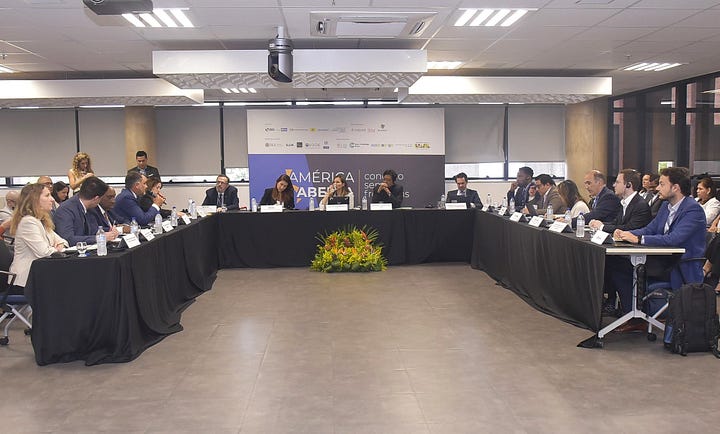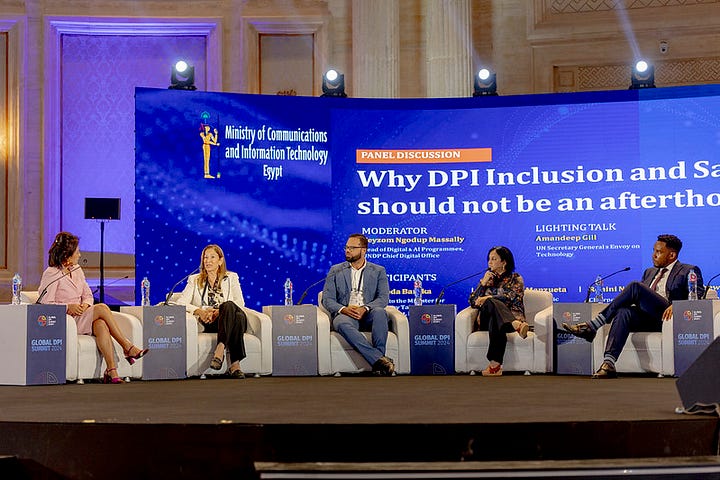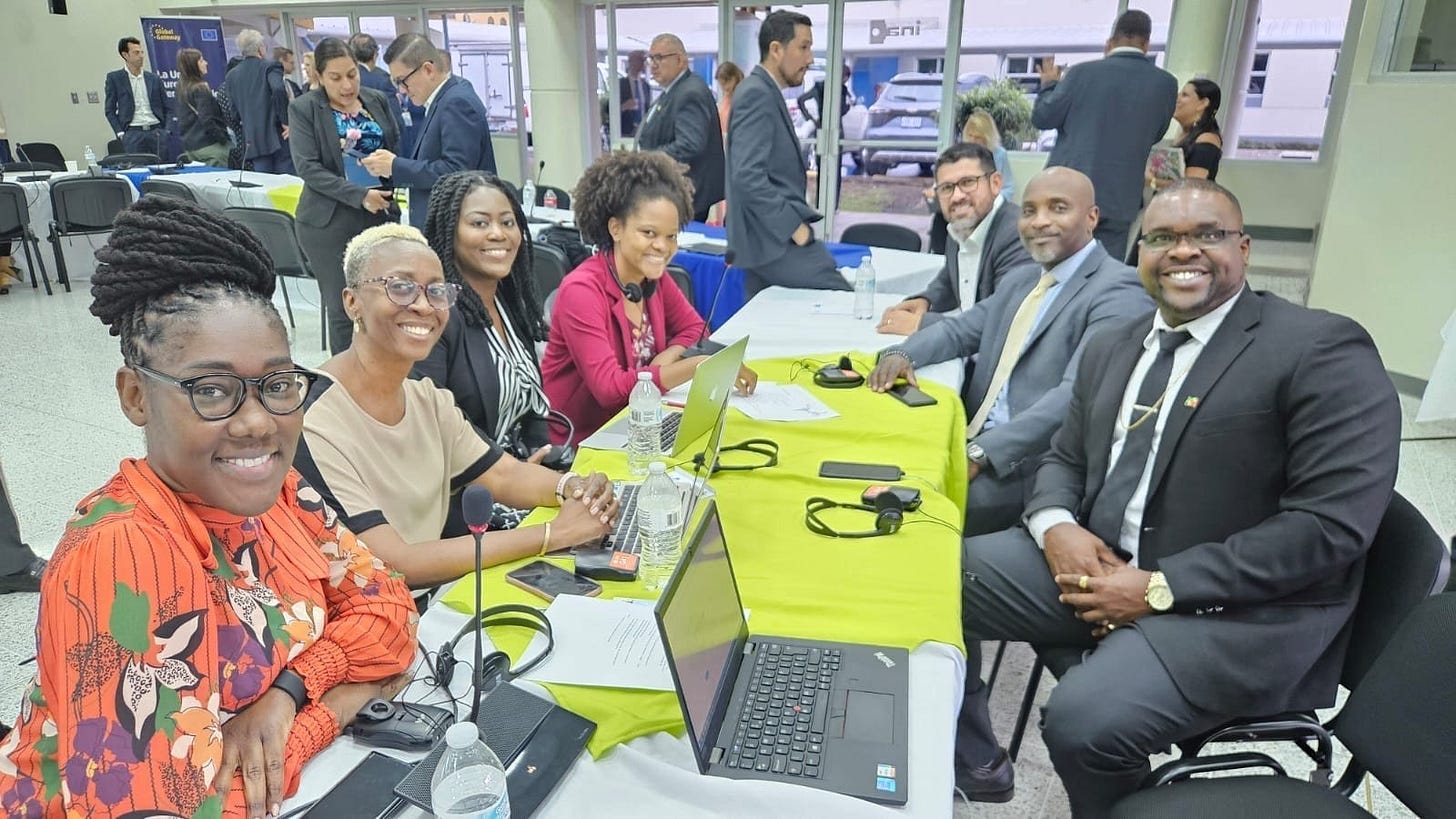A year working in the open. Our 2024 Retrospective.
In our first Year Ahead reflection, What We Do Together, we shared a commitment to working more in the open. After a year of workshopping, (semi)monthly newsletters, publishing essays (many more stuck in drafts), discussion forums and talks, we wanted to close out 2024 with a retrospective. Moving forward, these “Retrospective” essays will wrap each year, providing highlights from our work, sharing context on our intentions, and celebrating the work we are doing together as a community.
We are immensely grateful to each of you who takes the time to read these updates, share them with colleagues, show up for events, send emails with your thoughts, and contribute your experiences and expertise to the problems we’re working on.
Moving faster towards a Jamaica and Caribbean region that works for all of us requires all of our efforts. Thank you for your willingness to do some of this important work with us at the SlashRoots Foundation.
Without further ado, check out SlashRoots’ 2024 Retrospective.
- David & Matthew
Foundations for a Different Kind of Transformation Agenda
At SlashRoots, we believe that to accelerate our progress in the Caribbean, we must distribute the ability to solve problems across the entire society.
If we are to outpace the rapidly evolving challenges we face and the growing impatience of our people, this is something we must do. But making this shift requires introducing new ways of working, broadening participation in problem-solving, and, in some cases, creating new institutions. And this work needs to take place across government, the private sector, and societal actors.
In 2024, we began setting the foundations for new ways for civil society to contribute to the challenges of place-making and public participation in decision-making. We’d like to share some of those updates with you.
OneCity’s First Contributions to Jamaica’s Urban Planning and Public Participation Discourse
We launched the OneCity Initiative in December 2023 alongside the Caribbean Policy Research Institute (CAPRI), Mona GeoInformatics, and FightForPeace. This action research and design initiative aims to create more effective pathways for communities and young people to shape the direction of their environment and the institutions that serve them.
Throughout the year, the teams have met with various public institutions, researchers and community advocates to discuss urban governance and the state of community engagement in local decision-making. Towards the end of the year, we were able to share the initiative’s first contributions to the public discourse. In December, we previewed the OneCity Explorer and index–an effort to create a holistic measure of how well each community across our country supports integration into mainstream society. You can check out the launch here.
Through another component of the project, we examine the effectiveness of the different ways public and private institutions engage communities in decisions that affect their lives. We held our first problem discovery workshop in November, and the discussions were compelling. The energy in the room matched what we had been hearing from stakeholder interviews. There is a lot of interest and shared recognition of the need to reform how institutions work with communities to make decisions. We’ll ramp up consultations and generative discussion during the first half of this year, including a follow-up workshop held virtually on January 24th. If that sounds like something you’d like to contribute to, you can register here to join us.
Co-Creating Jamaica’s Second OGP National Action Plan
We worked with the Ministry of Finance & the Public Service, civil society and other public sector organisations to craft Jamaica's Second Open Government Partnership National Action Plan (NAP). OGP provides an alternative model for collaboration between the reformers within the public sector and civil society on priority initiatives.
The Second National Action Plan builds on the momentum and commitment areas of Jamaica’s first National Action Plan, with updated activities and proposals crafted by joint public sector and civil society working groups. Commitments range from Anti-Corruption reforms to revitalising Jamaica’s Open Data and Access to Information infrastructure to several important environmental reforms that strengthen regulations and safeguards. The implementation window for the new National Action Plan begins in January and runs until 2026. One of the priorities in the new cycle is to further open up the policy process through better communication and improved working group collaboration.
We also supported Jamaica’s contributions to the OGP community at the regional level. Matthew attended the Regional OGP Summit in Brasilia, where he participated in a high-level panel on the Future Of Open Government with Sanjay Pradhan, OGP’s CEO, and 14 representatives of governments and civil society.


A Collective Reimagining of What Digital Can Mean for Our Region
There is a great wave of change underway across the world because of advances in digital technology. The Caribbean is no different. At SlashRoots, we believe that these changes provide our region with an opportunity to think differently about how our society works and the institutions that support it. But if we are to successfully create a Jamaica and a Caribbean region that is different from our present and avoid the mistakes of our past, we have to be intentional in articulating and building towards the community that we want. We started the Digital Democracy Series to create space for this reimagining.
The discussion series brings together experts, policymakers, and civil society to interrogate existing ways of working, highlight alternative approaches and solutions from across the globe and the region, and generate new ideas for what the Caribbean’s approach could be.
We held two forums in 2024. In the first discussion, we asked what it would take for everyone in our community to have trusted ways to establish who they are. Using Jamaica’s NIDS as the context, we discussed ongoing scepticism of the initiative and new ways it might create value for everyday Jamaicans. Critically, the discussants highlighted that universal access to identification required more than just introducing a new technology.
The second forum looked at the role that trust plays in unlocking the wide adoption of digital systems. It was fascinating to unpack with the speakers and attendees the different practices and considerations organisations are using and can employ to build trust, especially in contexts where trust is low within the broader society or at the organisational level.
If you missed either of these discussions, we encourage you to check them out on our YouTube page. We greatly appreciate the community’s feedback, support, and contributions to this undertaking. We’ll continue the series in 2025 and look forward to holding more space for these important discussions.
Caribbean Perspectives. Global Dialogue
Contributing to global discussions and institution building has been an important part of SlashRoots’ mission since its inception. In 2024, we helped shape some consequential global goods at the UN, regionally, and with like-minded civil society organisations across the globe.
A Global Framework for Safe and Inclusive Digital Public Infrastructure
Back in April, we shared that Matthew was selected by the Office of the UN Secretary General’s Envoy on Technology and the UN Development Programme to serve on a working group for the Universal DPI Safeguards Initiative. Forty-four global experts, including two others from the Caribbean, were charged with creating a framework for member states as part of a global consultative process.
Together, the working group developed the Universal DPI Safeguards Framework, which was released at the UN General Assembly. Its publication coincided with 193 member states endorsing the Global Digital Compact (GDC) as part of the UN Pact for the Future. In the GDC, member states recognised the importance of safeguards for DPI and their potential for promoting inclusive digital transformation.


For more than a decade, civil society, academics, and other public interest actors have been saying that regardless of how transformative the digital public infrastructure approach might be, it will not be enough if we don’t get the values, governance, and safeguards right. At the UN General Assembly and the Global DPI Summit in Cairo, DPI Safeguards were very much part of the centre stage. The Framework is a major milestone that provides an overarching set of principles and an operational knowledge base to inform the implementation of DPI projects.
Several DPI efforts are underway in the region, such as Jamaica’s National ID card (NIDS), the Dominican Republic’s Carpeta Ciudadana, and Trinidad and Tobago’s National ID. The Dominican Republic is already operationalising the UN DPI Safeguards, and we look forward to seeing and supporting other Caribbean governments in doing the same.


Contributing to the EU, Latin America and the Caribbean Policy Dialogue
The EU-LAC Digital Alliance is a flagship initiative under the EU’s Global Gateway strategy. It fosters digital cooperation between Europe, Latin America, and the Caribbean and aims to strengthen partnerships in digital transformation by promoting equitable access to technology, advancing governance frameworks, and enhancing digital infrastructure.
In May, our Senior Service Designer, Denique Soutar, represented the organisations at the EU-LAC Digital Alliance High-Level Policy Dialogue on E-Governance, held in San José, Costa Rica. This event brought together stakeholders, including government leaders, civil society, and private sector representatives, to address shared priorities such as cross-border cooperation, interoperability, and the implementation of digital public services.
The dialogue underscored the importance of collaboration between regions to address common challenges, such as the digital divide, and leverage technology for societal progress. We continue to advocate for better approaches to expanding inclusion in digital transformation efforts across the Caribbean and elsewhere. Impacting the policy choices in regional mechanisms and large markets, like the EU, provides another channel to advance this goal.
A Global Coalition for Inclusive and Rights-Respecting Digital ID
SlashRoots is a founding member of the Human Rights For Identity (HR4ID) Coalition, a transnational civil society coalition dedicated to advancing human rights in the design and implementation of digital identity systems. The coalition, comprising over 50 civil society organisations worldwide, was formally launched at the 2023 Internet Governance Forum in Japan. It hosted a public session attended by the United Nations Secretary General’s Envoy on Technology, Amandeep Singh.
The H4ID coalition identified multiple priority initiatives for 2024. These included strengthening information sharing across the network, collaborating on multilateral engagement (including outreach to the World Bank, convenings for the UN Universal Safeguards Initiative and contributing to Brazil’s G20 Presidency), conducting a mapping of digital ID legislation across countries and working together to develop common positions and resources on critical policy issues. The legislative map and the common positions are expected to be published in early 2025. Denique will represent SlashRoots at the 2025 staging of RightsCon in Taiwan, where the mapping project and the first common positions are expected to be previewed.
New Experiments for Change
SlashRoots is proud to have been selected for the 2024 FORGE Experiments for Change programme. This initiative supports experimental approaches to addressing systemic challenges and transforming the fields of global rights and justice. Our project, “Citizen Participation for the Rollout of Jamaica’s National Digital ID,” was one of only four projects chosen this year, placing us among the programme’s inaugural cohort.
Our project focuses on designing meaningful opportunities for citizen participation during the rollout of Jamaica’s National Digital ID system. Through public dialogues, workshops, and co-creation sessions, we aim to ensure the system respects human rights and meets the diverse needs of Jamaica’s population. This initiative underscores the importance of rights-respecting digital frameworks and highlights the power of inclusive, citizen-centred design.
We extend our gratitude to the NYU Center for Human Rights and Global Justice for their support, and we look forward to collaborating with the FORGE team to advance solutions to this critical issue.
A New Dimension to SlashRoots – An In-House Policy Team
Our ambition is to make SlashRoots the best place in the Caribbean to do socially impactful work at scale. This year, we took another step towards this vision by adding an in-house Policy Team.
Gavin Myers – Policy Lead
Gavin Myers brings extensive experience as a community engagement researcher and strategist. He led outreach programmes for the National Integrity Action (NIA) and developed citizen engagement frameworks that bridge the gap between communities and policymakers.
Gavin is also completing his PhD at the Open University, where his research focuses on the collaboration strategies of Caribbean diaspora organisations. He is leading SlashRoots' new Active Citizenship Programme Area, through which we aim to build more effective and expansive social partnerships across the region.
Amillea Moore – Policy Analyst
Amillea Moore joins us with a strong background in community and economic development. She holds an MSc in International Public and Development Management from UWI Mona and previously worked at ProjectStar, where she designed employability training pathways for underserved populations.
As a member of the Policy Team, Amillea supports projects across the SlashRoots portfolio, particularly our work on Jamaica’s Open Government Programme and OneCity research on Jamaica’s public participation ecosystem.
Gavin and Amillea have brought fresh perspectives, skills, and energy to SlashRoots. We’re excited about the new capabilities they bring to the team and look forward to continuing this journey together.
Looking Ahead
As we begin 2025, we are energised by the progress and partnerships we’ve built. The challenges facing Jamaica and the Caribbean are complex, but they also present opportunities for innovation, collaboration, and transformation.
We remain committed to tackling these challenges head-on, anchored in our values and driven by a deep commitment to accelerating our progress as a region.
We close how we began. Moving faster towards a Jamaica and Caribbean region that works for all of us requires all of our efforts. With deep sincerity, thank you for your willingness to do some of this important work with us at the SlashRoots Foundation. We’re excited to continue working alongside you to take hold of what’s possible for our region in 2025 and beyond.
Onwards and upwards, ever.
David and Matthew.









